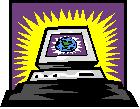Topics: The "Flat World" of Thomas Friedman A Head Start: Global Communication Systems Project Instructor: Jack
Lule On this page are the assignments for Thursday of Week 5. DEADLINES: You should have Thursday's assignment completed by Monday, at 7 p.m. The assignment is purposefully short. Because the summer session moves so quickly, I wanted to give you an early start on your final project, a study of another nation's media. I will post that assignment for Week Six, Day One today as well so you can start on it as soon as you're done with today's readings.
THE "FLAT WORLD" OF THOMAS FRIEDMAN Our readings for today confront one of the most challenging and important terms of our time -- "globalization." We will use the work of an important writer, Thomas Friedman, who, incidentally, not long ago met with Lehigh students of journalism and international relations. I want you first to read an interview with Friedman in Wired magazine so you know more about him and his ideas. Then, I want you to read a magazine article by Friedman that is adapted from his book, The World Is Flat. Then, please send me an email that answers these questions: 1) Who is Thomas Friedman and why has he attained such importance? 2) What does he mean that the world is flat? What are some of the key "levelers" of the world? 3) Why does Friedman compare our era to 1957 and the flight of the Sputnik?
Head Start: Global Media Systems Project It doesn't seem that long ago that we were beginning Week One and introducing ourselves online. It's hard to believe but in one week, the first summer session will be over. Our journey through international communication has been fast and fun. We've covered a lot of ground — literally and figuratively. Our final project takes us around the world one more time: Your assignment is an examination of one nation's media system. Most of us are familiar with the media system of our home country. We know a little history of the media. We know the relationship between the media and the government. We know the role of advertising. We have some idea of literacy and the availability of broadcast media. We know some of the important media. A wonderful way to learn, however, is to step outside our own familiar territory. Unfortunately, there is no good way to survey how the media operate "around the world." The task is too daunting. But being exposed to one other nation is a wonderful learning experience. People who have lived in other countries soon realize that the media are different from place to place. Governments might be much more restrictive. Advertising might be tightly controlled. Religion may play a large role. Literacy rates might be very low so that newspapers are scarce. People might be too poor to afford televisions. Radio might be the dominant medium. An examination of one nation's media system will thus broaden immeasurably our knowledge of international communication. ASSIGNMENT Your assignment thus is to
research and write a final project on the media system of another nation.
I'll assign the countries to you via email to help you get started —
many students get overwhelmed and stuck when faced with the prospect
of choosing any one nation from around the world. Also, from experience,
I know that some nations' media systems have more information available
about them. Again, you will find the full assignment at Week Six, Day One. It is due on our last day, Thursday, Week Six. return to J/IR 246 International Communication
|
